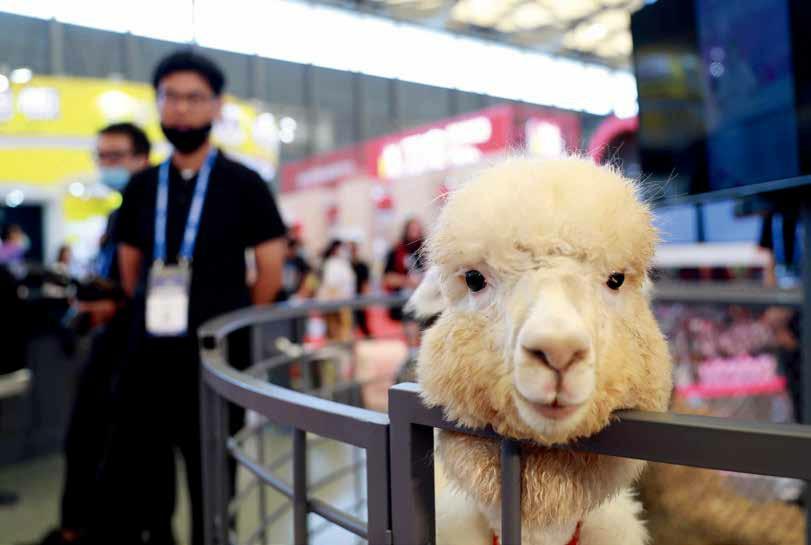Life in the Pandemic
2021-02-24byZhouXin
by Zhou Xin



Epidemic or not, life goes on. When the COVID-19 outbreak is bad, people are forced to stay at home and pass the time by doing indoor exercises, taking online classes, holding video conferences, watching live broadcasts, shopping online, and caring for pets. When major progress was made in epidemic prevention and control in China, life gradually returned to normal. Hidden behind masks, people finally exited homes and ventured into bookstores, restaurants and shopping malls. The epidemic has made people realize the importance of saving food and living a low-carbon life. Behind the masks, the Chinese continue to smile.
Ecological Tourism
In 2020, the COVID-19 pandemic forced people to rethink the relationship between man and nature. Peoples demands to return to nature, appreciate natural beauty, and enjoy wilderness scenery increased alongside greater awareness of the dangers of exploitation of nature. Eco-tourism, which aims to protect nature through offering tourism services, has become the trend for Chinese travelers.
The tourism industry should try to develop eco-tourism projects with brand influence, integrate ecotourism into infrastructure construction, and fully embrace the requirements of ecological civilization to promote these industries in tandem as a cohesive force.
Gao Shunli, special researcher at the Tourism Research Center of the Chinese Academy of Social Sciences
Clearing Your Plate
The Food and Agriculture Organization of the United Nations estimates that about 1.3 billion tons of food are wasted around the world every year―thats about one-third of all the food produced worldwide. Yet, extremely poor people throughout the world still lack sufficient nutritional supply. In 2020, Chinas central leadership called for the whole country to join a campaign to save food to strengthen human food security while reducing the environmental burden.
Saving what might have been wasted is essentially ‘green production. Saving food is equivalent to increasing production without using land, water resources, pesticides, fertilizers, or labor. It is akin to increasing production without any investment.
Wang Hong, head of the Department of Warehousing and Technology of the National Food and Strategic Reserves Administration of China
Taijiquan
On December 17, 2020, UNESCOs Intergovernmental Committee for the Safeguarding of the Intangible Cultural Heritage inscribed Chinas Taijiquan onto the Representative List of the Intangible Cultural Heritage of Humanity. Taijiquan became the 41st item from China to be included in the list.
Since it took shape in the mid-17th century, Taijiquan has been passed on from generation to generation, with practitioners all over China. Moreover, it has been widely practiced overseas. Taijiquan has no restrictions on the gender, age, physical condition, occupation, and ethnicity of the practitioners. Through the practice of Taijiquan, people can not only build up their bodies, but also pass on traditional Chinese culture. At temporary treatment centers in Wuhan, medical staff sometimes led COVID-19 patients with mild symptoms to practice Taijiquan to improve their physical fitness.
The extensive emphasis of the ‘doctrine of the Mean in Taijiquan fills the essence of Taijiquan culture with the ‘wisdom of the Mean. ‘Holding the Mean, keeping the Mean, and using the Mean is the most fundamental principle of Taijiquan practitioners to learn and practice, and this principle is undoubtedly in line with the‘doctrine of the Mean advocated by traditional Chinese philosophy.
Wang Gang, professor and doctoral supervisor at Wuhan Sports University
Livestreaming E-commerce
Livestreaming e-commerce was not new for 2020, but due to the epidemic, people reduced outdoor activities and livestreaming sales experienced a blowout growth. Movie stars, experts, and even government officials got involved in hawking goods online. The report “Livestreaming E-commerce towards Trillion-Yuan Market” jointly released by KPMG and Ali Research estimated that the scale of livestreaming e-commerce would exceed one trillion yuan (US$157.5 billion) in 2020 and reach two trillion yuan (US$315 billion) in 2021.
Livestreaming e-commerce has emerged as a form of online shopping in recent years. It still needs to be supervised by law, and salespeople bear some responsibility for the products they pitch. We should strengthen supervision of livestreaming e-commerce with a cautious attitude to preserve the original intentions of the industry.
Chang Liang, executive director of Beijing Jiashan Law Firm
College Entrance Examination
The epidemic posed a challenge to the 2020 college entrance examination. On July 7, 10.71 million candidates around China entered examination rooms a month later than in previous years. This college entrance examination was the largest collective activity in China after the outbreak of COVID-19. The number of participants was equivalent to the entire population of Sweden. Automatic temperature monitoring equipment, hand disinfectants, disposable masks, and social distancing of more than a meter became standard requirements for the 2020 examination. Departments of education, transportation, public security, disease prevention and control, meteorology and others were mobilized to make joint efforts to facilitate the college entrance examination.
The essence of Chinas college entrance examination is not simply about knowledge; it is a massive social project. The design of any college entrance examination system must consider whether families and students from different living conditions can participate on equal footing.
Yang Xuewei, former director of the National Education Examinations Authority of China
Domestic Brands
In recent years, many Chinese consumers have begun to favor domestic brands. Some time-honored brands with fresh elements have enjoyed a renaissance. Compared with top international brands featuring steep prices, domestic Chinese products often offer both fashion and affordability. These days, they are integrating Chinese traditional cultural elements into their designs, which has been a hit with consumers. Behind the trend there is also a drive to nurture established domestic brands. The urgent need to win favor from a new generation of customers makes evolving old brands even more crucial.
When members of the young generation find domestic brands maturing alongside them and reemerging in a refreshing way, the surprises can evoke nostalgia. Emotions are driving the trend boosting some time-honored domestic brands.
Li Jin, head of digital marketing for Pechoin, a time-honored Chinese cosmetic brand
Pet Economy
The increase in Chinas per capita income, single population, and average life expectancy, coupled with a decline in the fertility rate, has led to changes in the social and family structure, creating rising demand for pet companionship. Pets have become life partners for many Chinese people. Chinas “pet economy” is seeing a boom.
Having pets is compensation for a lack of companionship. The sector is essentially an emotional needs-based leisure service provided by the market.
Li Guangdou, a market research expert
Online Education
The outbreak of COVID-19 accelerated the popularization of online education. Students had to find ways to embrace remote learning, and the education industry has since shifted to an era of online-offline integrated development. Chinas online education market size is estimated to reach 485.8 billion yuan (US$74.47 billion) in 2020, with the number of users surpassing 351 million.
The epidemic broke down the boundaries of education. The fast penetration of online education caused new types of integration such as between technology and education and between online and offline education.
Wu Jiajun, co-founder of Chinese online education firm Zhangmen
Staying at Home
In the first half of 2020, during the worst days of the epidemic in China, most Chinese people stayed at home to cooperate with the national measures for epidemic prevention and control, avoid infection, and protect themselves and the people around them. They showed a high degree of self-discipline and great solidarity. Isolation at home became one of the key methods for China to quickly control the spread of the virus.
Every person you talked to in China had a sense that they were mobilized in a war against the virus, and they were organized. Its never easy to motivate the necessary passion, commitment, interest, and individual sense of duty to stop the virus.
Bruce Aylward, senior advisor to Director General of the World Health Organization